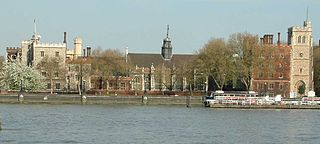
Boniface of Savoy was a medieval Bishop of Belley in Savoy and Archbishop of Canterbury in England. He was the son of Thomas, Count of Savoy, and owed his initial ecclesiastical posts to his father. Other members of his family were also clergymen, and a brother succeeded his father as count. One niece Eleanor of Provence was married to King Henry III of England and another was married to King Louis IX of France. It was Henry who secured Boniface's election as Archbishop, and throughout his tenure of that office he spent much time on the continent. He clashed with his bishops, with his nephew-by-marriage, and with the papacy, but managed to eliminate the archiepiscopal debt which he had inherited on taking office. During Simon de Montfort's struggle with King Henry, Boniface initially helped Montfort's cause, but later supported the king. After his death in Savoy, his tomb became the object of a cult, and he was eventually beatified in 1839.
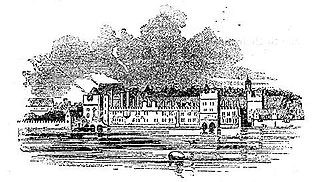
The Savoy Palace, considered the grandest nobleman's townhouse of medieval London, was the residence of prince John of Gaunt until it was destroyed during rioting in the Peasants' Revolt of 1381. The palace was on the site of an estate given to Peter II, Count of Savoy, in the mid-13th century, which in the following century came to be controlled by Gaunt's family. It was situated between the Strand and the River Thames. The Tudor-era Savoy Chapel was located on the former estate property and carried on the name; today, the name is carried on by the Savoy Theatre and Savoy Hotel, again both located on the former estate. In the locality of the palace, the administration of law was by a special jurisdiction, separate from the rest of the county of Middlesex, known as the Liberty of the Savoy. French monarch John II of France died here after an illness.

The King's College of Our Lady and Saint Nicholas in Cambridge, also known as simply King's College is a constituent college of the University of Cambridge. This college lies beside the River Cam and faces out onto King's Parade in the centre of the city.
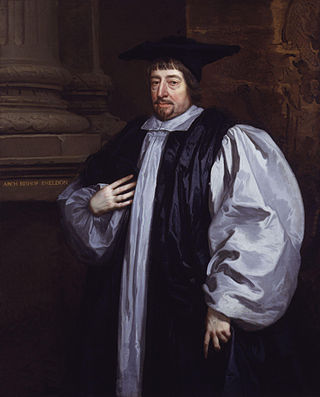
Gilbert Sheldon was an English religious leader who served as the Archbishop of Canterbury from 1663 until his death.

Thomas Fuller was an English churchman and historian. He is now remembered for his writings, particularly his Worthies of England, published in 1662, after his death. He was a prolific author, and one of the first English writers able to live by his pen.
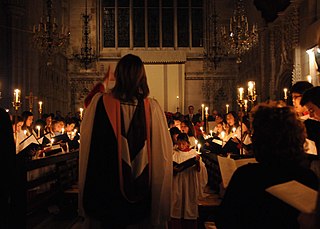
Nine Lessons and Carols, also known as the Festival of Nine Lessons and Carols and Service of Nine Lessons and Carols, is a service of Christian worship traditionally celebrated on or near Christmas Eve. The story of the fall of humanity, the promise of the Messiah, and the birth of Jesus is told in nine short Bible readings or lessons from Genesis, the prophetic books and the Gospels, interspersed with the singing of Christmas carols, hymns and choir anthems.

Strand is a major thoroughfare in the City of Westminster, Central London. The street, which is part of London's West End theatreland, runs just over 3⁄4 mile (1.2 km) from Trafalgar Square eastwards to Temple Bar, where the road becomes Fleet Street in the City of London, and is part of the A4, a main road running west from inner London.

The Royal Victorian Order is a dynastic order of knighthood established in 1896 by Queen Victoria. It recognises distinguished personal service to the monarch, members of the royal family, or to any viceroy or senior representative of the monarch. The present monarch, King Charles III, is the sovereign of the order. The order's motto is Victoria. The order's official day is 20 June. The order's chapel is the Savoy Chapel in London.

John Yonge was an English ecclesiastic and diplomatist, who also served as Master of the Rolls from 1507 until his death.

A chapel royal is an establishment in the British and Canadian royal households serving the spiritual needs of the sovereign and the royal family.
A royal peculiar is a Church of England parish or church exempt from the jurisdiction of the diocese and the province in which it lies, and subject to the direct jurisdiction of the monarch or, in Cornwall, of the Duke of Cornwall.

A fan vault is a form of vault used in the Gothic style, in which the ribs are all of the same curve and spaced equidistantly, in a manner resembling a fan. The initiation and propagation of this design element is strongly associated with England.
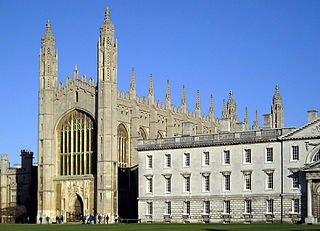
King's College Chapel is the chapel of King's College in the University of Cambridge. It is considered one of the finest examples of late Perpendicular Gothic English architecture and features the world's largest fan vault. The Chapel was built in phases by a succession of kings of England from 1446 to 1515, a period which spanned the Wars of the Roses and three subsequent decades. The Chapel's large stained glass windows were completed by 1531, and its early Renaissance rood screen was erected in 1532–36. The Chapel is an active house of worship, and home of the King's College Choir. It is a landmark and a commonly used symbol of the city of Cambridge.
Trinity College Chapel may refer to:
A choral scholar is a student either at a university or private school who receives a scholarship in exchange for singing in the school or university's choir. This is a common practice in the UK at schools attached to cathedrals where the choir is the cathedral choir, and at Oxford and Cambridge University Colleges, many of which have famous choirs.
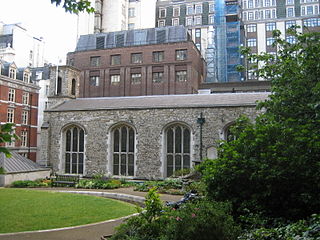
The King's Chapel of St John the Baptist in the Precinct of the Savoy, also known as the King's Chapel of the Savoy, is a church in the City of Westminster, London. Facing it are 111 Strand, the Savoy Hotel, the Institution of Engineering and Technology and – across the green to its side – the east side of Savoy Street. The chapel is designated as a Grade II* listed building.
Edward Martin, D.D. was an English clergyman, ejected President of Queens' College, Cambridge, and at the end of his life Dean of Ely.

Sir Nathaniel Lloyd (1669–1741) was an English jurist and Master of Trinity Hall, Cambridge.
Samuel Pratt was a Canon of Windsor from 1697 - 1723 and Dean of Rochester from 1706 - 1723.
This is a list of events from British radio in 1928.













